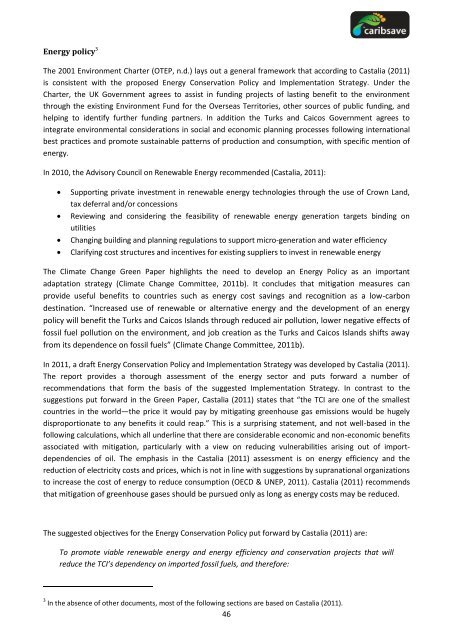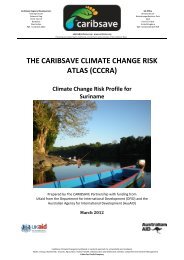You also want an ePaper? Increase the reach of your titles
YUMPU automatically turns print PDFs into web optimized ePapers that Google loves.
Energy policy 3<br />
The 2001 Environment Charter (OTEP, n.d.) lays out a general framework that according to Castalia (2011)<br />
is consistent with the proposed Energy Conservation Policy <strong>and</strong> Implementation Strategy. Under the<br />
Charter, the UK Government agrees to assist in funding projects of lasting benefit to the environment<br />
through the existing Environment Fund for the Overseas Territories, other sources of public funding, <strong>and</strong><br />
helping to identify further funding partners. In addition the <strong>Turks</strong> <strong>and</strong> <strong>Caicos</strong> Government agrees to<br />
integrate environmental considerations in social <strong>and</strong> economic planning processes following international<br />
best practices <strong>and</strong> promote sustainable patterns of production <strong>and</strong> consumption, with specific mention of<br />
energy.<br />
In 2010, the Advisory Council on Renewable Energy recommended (Castalia, 2011):<br />
Supporting private investment in renewable energy technologies through the use of Crown L<strong>and</strong>,<br />
tax deferral <strong>and</strong>/or concessions<br />
Reviewing <strong>and</strong> considering the feasibility of renewable energy generation targets binding on<br />
utilities<br />
Changing building <strong>and</strong> planning regulations to support micro-generation <strong>and</strong> water efficiency<br />
Clarifying cost structures <strong>and</strong> incentives for existing suppliers to invest in renewable energy<br />
The Climate Change Green Paper highlights the need to develop an Energy Policy as an important<br />
adaptation strategy (Climate Change Committee, 2011b). It concludes that mitigation measures can<br />
provide useful benefits to countries such as energy cost savings <strong>and</strong> recognition as a low-carbon<br />
destination. “Increased use of renewable or alternative energy <strong>and</strong> the development of an energy<br />
policy will benefit the <strong>Turks</strong> <strong>and</strong> <strong>Caicos</strong> Isl<strong>and</strong>s through reduced air pollution, lower negative effects of<br />
fossil fuel pollution on the environment, <strong>and</strong> job creation as the <strong>Turks</strong> <strong>and</strong> <strong>Caicos</strong> Isl<strong>and</strong>s shifts away<br />
from its dependence on fossil fuels” (Climate Change Committee, 2011b).<br />
In 2011, a draft Energy Conservation Policy <strong>and</strong> Implementation Strategy was developed by Castalia (2011).<br />
The report provides a thorough assessment of the energy sector <strong>and</strong> puts forward a number of<br />
recommendations that form the basis of the suggested Implementation Strategy. In contrast to the<br />
suggestions put forward in the Green Paper, Castalia (2011) states that “the TCI are one of the smallest<br />
countries in the world—the price it would pay by mitigating greenhouse gas emissions would be hugely<br />
disproportionate to any benefits it could reap.” This is a surprising statement, <strong>and</strong> not well-based in the<br />
following calculations, which all underline that there are considerable economic <strong>and</strong> non-economic benefits<br />
associated with mitigation, particularly with a view on reducing vulnerabilities arising out of importdependencies<br />
of oil. The emphasis in the Castalia (2011) assessment is on energy efficiency <strong>and</strong> the<br />
reduction of electricity costs <strong>and</strong> prices, which is not in line with suggestions by supranational organizations<br />
to increase the cost of energy to reduce consumption (OECD & UNEP, 2011). Castalia (2011) recommends<br />
that mitigation of greenhouse gases should be pursued only as long as energy costs may be reduced.<br />
The suggested objectives for the Energy Conservation Policy put forward by Castalia (2011) are:<br />
To promote viable renewable energy <strong>and</strong> energy efficiency <strong>and</strong> conservation projects that will<br />
reduce the TCI’s dependency on imported fossil fuels, <strong>and</strong> therefore:<br />
3 In the absence of other documents, most of the following sections are based on Castalia (2011).<br />
46





